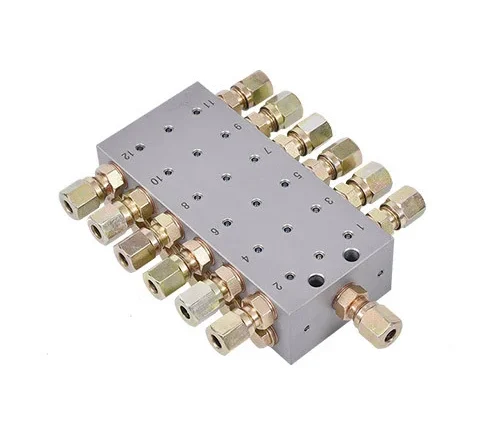Grease distributor block
The grease distributor block, often referred to simply as a grease block, is a vital component in various industrial and mechanical systems. This unassuming device plays a crucial role in ensuring the smooth operation and longevity of machinery by delivering lubrication precisely where it’s needed. In this exploration of the grease distributor block, we’ll delve into its functions, types, applications, and the importance it holds in the world of engineering and manufacturing.
Functions of a Grease Distributor Block:
At its core, a grease distributor block is designed to distribute lubricating grease to multiple points within a machine or system. Its primary functions can be summarized as follows:
- Lubrication Distribution: The primary function of a grease distributor block is to distribute lubricating grease evenly and in controlled quantities to various points of a machine or mechanical system. This ensures that crucial components such as bearings, gears, and shafts remain adequately lubricated to reduce friction, prevent wear and tear, and extend their lifespan.
- Precision and Control: Grease distributor blocks are engineered to provide precise control over the amount and frequency of grease delivered to each lubrication point. This level of control is crucial in preventing over-lubrication, which can lead to equipment damage, and under-lubrication, which can result in premature wear and failures.
- Maintenance Efficiency: These blocks streamline the maintenance process by centralizing grease distribution. Maintenance personnel can easily access the block to replenish grease, reducing downtime and ensuring that lubrication points are consistently serviced.
Types of Grease Distributor Blocks:
Grease distributor blocks come in various designs and configurations to accommodate different applications and requirements. Some common types include:
- Single-Point Lubricators: These are compact grease distributor blocks designed to service a single lubrication point. They are often used in applications where regular manual lubrication is not practical or accessible.
- Multi-Point Lubricators: Multi-point grease distributor blocks are more complex and can supply grease to several lubrication points simultaneously. They are commonly used in industrial machinery with multiple moving parts that require regular lubrication.
- Progressive Distributors: Progressive distributors are a type of multi-point block that divides the lubrication process into stages. Grease is delivered sequentially to each lubrication point, ensuring a consistent and controlled flow.
- Dual-Line Systems: In dual-line systems, grease is distributed through two main lines, providing redundancy and reliability. This design is often used in critical applications where downtime must be minimized.
Applications of Grease Distributor Blocks:
Grease distributor blocks find applications in a wide range of industries and machinery, including:
- Manufacturing: In manufacturing plants, grease distributor blocks are used to lubricate conveyor systems, industrial robots, and various types of machinery such as presses, CNC machines, and injection molding equipment.
- Mining and Construction: Heavy-duty equipment in mining and construction, such as excavators, bulldozers, and rock crushers, rely on grease distributor blocks to ensure continuous operation in challenging environments.
- Agriculture: Farm equipment like tractors, combines, and harvesters benefit from grease distributor blocks to maintain the efficiency and longevity of moving parts.
- Transportation: Grease blocks are essential in the maintenance of trains, trucks, and buses, as they help reduce wear on wheel bearings, axles, and other critical components.
- Food Processing: In the food industry, where hygiene is paramount, stainless steel grease distributor blocks are used to lubricate equipment while maintaining sanitary conditions.
Importance in Machine Longevity:
The role of grease distributor blocks in maintaining machinery cannot be overstated. Without proper lubrication, friction can cause excessive heat and wear on machine components, leading to premature failure. Grease distributor blocks ensure that lubrication is provided consistently and precisely, reducing the risk of breakdowns, minimizing maintenance costs, and extending the operational life of equipment.
In conclusion, the grease distributor block may appear unremarkable, but its impact on the reliability and longevity of machinery is substantial. From manufacturing to agriculture, and from mining to food processing, these devices play a pivotal role in ensuring the smooth and efficient operation of countless industrial and mechanical systems. Their ability to deliver precise amounts of lubrication to critical points is a testament to the importance of precision engineering in modern machinery, and they continue to be a cornerstone of maintenance and reliability programs worldwide.



